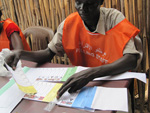
A consensus has emerged between Sudanese and U.S. officials, policy and advocacy groups that a new deal —facilitated with proper leverage from international actors—must be struck between the two Sudanese parties. This deal is needed to push forward implementation of outstanding provisions in the Comprehensive Peace Agreement, stabilize North-South relations for the future, and ultimately, maintain peace in Sudan through what will be a series of potentially volatile exercises.
Senior SPLM officials have already publicly said that this new political bargain would likely involve trade-offs over the status of Abyei, the financial relations between the potentially two new states, and border disputes. Less discussed, but equally as important to preserving stability, are negotiations over “accepting the results of the (southern) referendum,” as Pagan Amum said.
There are many reasons why the results and credibility of the southern referendum might be disputed even if the vote is one for secession—what most analysts and observers agree is what the southern population wants. The large likelihood of this destabilizing possibility should prompt international coordination now, rather than later.
A new Rift Valley Institute report titled, “Race Against Time,” offers a comprehensive look at the long list of procedural questions yet to be answered and ultimately makes the case that it is impossible, at this point, to hold a technically perfect vote. From hiring staff who will oversee voter registration and polling, to equipping state and county offices with materials, to clarifying voter eligibility, to finalizing how registration and voting results will be managed, a lot of work needs to be done but not enough time remains to do it.
In fact, the report makes clear that though the secession vote must be conducted at a higher standard than Sudan’s April elections, there is even less time for preparations this time around. The referendum’s legitimacy will also depend on 60 percent of registered southern voters turning out on referendum day to actually cast a vote—not the easiest task given the logistical challenges in South Sudan. And if secession is the result, each electoral irregularity, however slight or uncontrollable, offers the ruling National Congress Party an opportunity to question the credibility of the vote.
Given these realities (and the fact that many technical errors will happen because political intransigence has played a large role in delaying implementation until the eleventh hour) the report argues:
…[T]he parties should recommit to respecting the outcome of the Southern Sudan referendum, waiving their right to object on technical grounds, and instead committing themselves to unequivocal acceptance of the judgment of the secretary-general’s panel on the referendum, with the members of the UN Security Council and AU also pledging to uphold the panel’s verdict. Reaching such an agreement by December, in advance of the vote, could be pivotal in ensuring that the 9 January poll is not the prelude to further violence.
Securing agreement within the international community (whose members will be prone to dispute if the legitimacy of the vote for secession seems questionable) and between the two Sudanese parties (whose respective verdicts will be anything but neutral) over who will deliver the final judgment on the referendum results is critical to a peaceful referendum and, some may argue, ensuring that the will of the southerners are truly represented. In the current environment – with international engagement and coordination on Sudan at a new high, the two ruling parties still talking, and many bargaining chips on the table – it is also still doable.
Photo: Polling staff checks ballot during Sudan's April elections (Maggie Fick)

